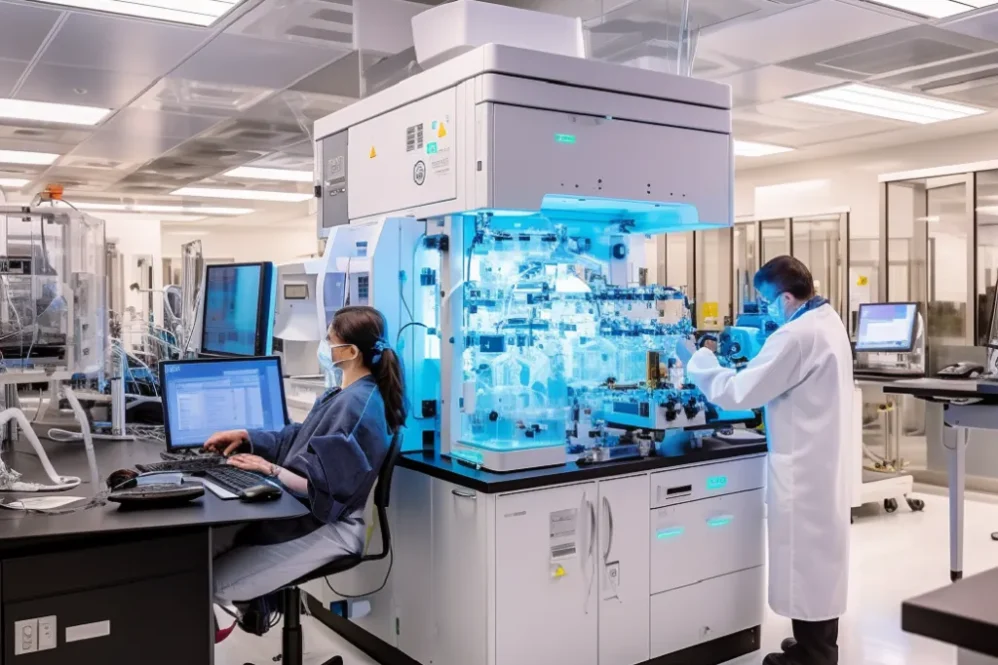Introduction:
The field of genomics has undergone a remarkable transformation with the advent of next-generation sequencing (NGS) technologies. Compared to the laborious and costly methods used in the Human Genome Project, NGS has revolutionized the process of DNA and RNA sequencing, making it faster, more efficient, and affordable. This progress has unlocked numerous opportunities in personalized medicine, disease prevention, and scientific research.
Next-Generation Sequencing (NGS)
Transforming Genomics: NGS platforms have drastically changed the genomics landscape by enabling the generation of millions of DNA sequences in a single run. This tremendous throughput has empowered researchers to tackle ambitious projects like the 1000 Genomes Project, aiming to comprehensively catalog human genetic variation. The ability to produce massive amounts of data has led to the development of sophisticated bioinformatics tools and algorithms that can analyze and interpret these vast datasets. As a result, scientists can now identify disease-associated genetic variants, unravel the molecular mechanisms of cancer, and explore intricate gene-environment interactions.
NGS in Personalized Medicine and Clinical Diagnostics: Moreover, NGS technologies have had a profound impact on clinical diagnostics and personalized medicine. Whole-exome sequencing has emerged as a valuable tool for diagnosing rare genetic disorders by focusing on protein-coding regions of the genome. Targeted gene panels allow for the screening of specific genetic mutations associated with cancer, facilitating more precise treatment options. Non-invasive prenatal testing (NIPT) has also been made possible through NGS, enabling the detection of fetal genetic abnormalities using fragments of fetal DNA in maternal blood, thereby minimizing the need for invasive procedures and associated risks.
Direct-to-Consumer Genetic Testing and Beyond: NGS has not only transformed scientific and medical practices but has also given rise to direct-to-consumer genetic testing services like 23andMe and AncestryDNA. These affordable and accessible options allow individuals to explore their ancestry, assess health risks, and gain insights into potential responses to specific medications.
NGS in Other Fields of Research: The rise of NGS technologies has also accelerated research in fields such as evolutionary biology, agriculture, and environmental science. By sequencing the genomes of various species, researchers can unravel evolutionary relationships, study the genetic basis of agriculturally important traits, and investigate the impact of environmental factors on gene expression.
NGS in Infectious Disease Research: NGS has also played a crucial role in the field of infectious disease research. By sequencing the genomes of pathogens, scientists can track the spread of outbreaks, identify drug-resistant strains, and develop targeted interventions. For example, during the COVID-19 pandemic, NGS has been instrumental in understanding the genetic makeup of the SARS-CoV-2 virus and monitoring its evolution.
Ethical Considerations and Challenges: While the benefits of NGS technologies are evident, several challenges and ethical considerations must be addressed. Data privacy and security are major concerns, as there is a risk of unauthorized access and potential misuse of genetic information. Proper data encryption, secure storage, and stringent access controls are crucial to protect individuals’ privacy and maintain public trust in genomics research.
Additionally, the interpretation of genetic data can be complex, and there is a need for better communication between healthcare professionals and patients to ensure responsible and effective use of the information. Genetic counseling and education play a vital role in helping individuals understand the implications of their genetic information, including potential health risks, treatment options, and ethical considerations.
Ensuring Equitable Access and Addressing Disparities: Another challenge is the potential for disparities in access to NGS technologies and the benefits they offer. Efforts must be made to bridge the “sequencing divide” and promote inclusivity in genomics research and healthcare, ensuring that advancements are accessible to all individuals, regardless of their socioeconomic status or geographic location.
Robust Regulations and Collaborative Efforts: In addition to access, robust regulatory frameworks are needed to govern the use of NGS technologies. Guidelines and standards should be established to ensure the quality and accuracy of sequencing results, the appropriate use of genetic information, and the responsible conduct of research. Ethical considerations regarding consent, data sharing, and potential discrimination must be carefully addressed to safeguard individuals’ rights and promote public trust in genomics research.
Collaboration and data sharing among researchers and institutions are also essential for maximizing the potential of NGS technologies. By promoting open science and fostering collaborations, researchers can accelerate discoveries and advancements in genomics.
Conclusion:
In conclusion, the rise of next-generation sequencing technologies has revolutionized genomics, accelerating our understanding of human biology and opening up new avenues for personalized medicine, disease prevention, and scientific research. However, it is essential to address the challenges and ethical considerations associated with these technologies to ensure that their benefits are realized in a responsible and equitable manner. Through robust data protection measures, improved communication, equitable access, and ethical frameworks, we can harness the full potential of NGS to improve human health, advance scientific knowledge, and promote the well-being of individuals and communities worldwide.
If you need more information on this article click on the link below. This link will provide more extensive information and elaborate on the topic. Click here to view original web page at citylife.capetown





